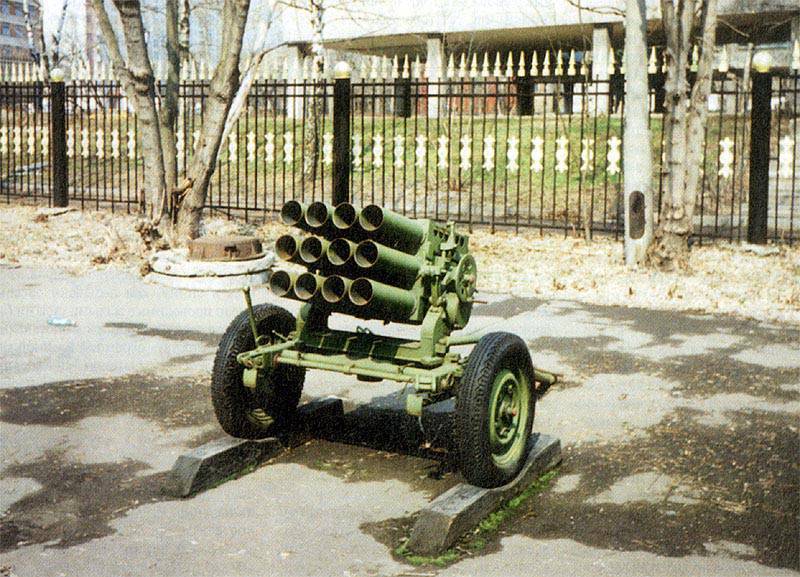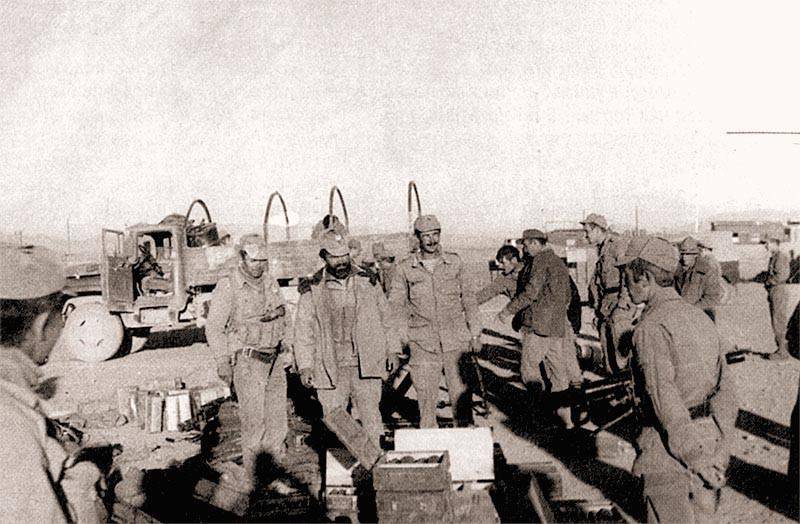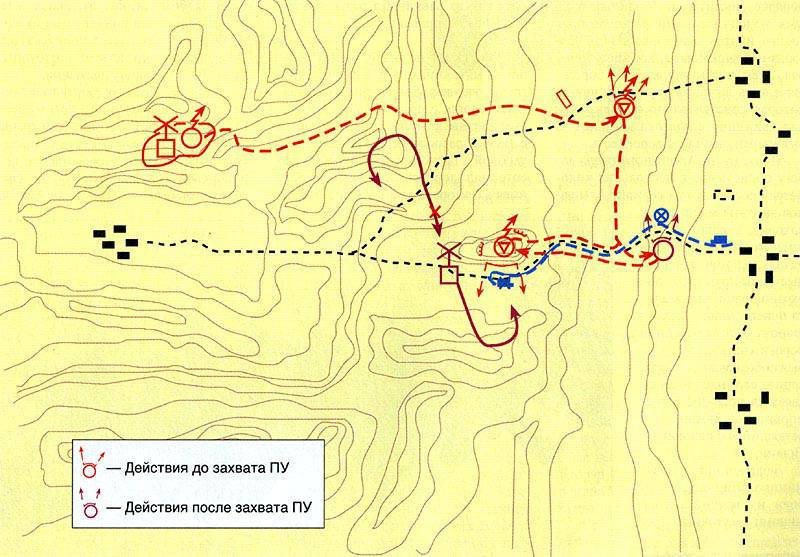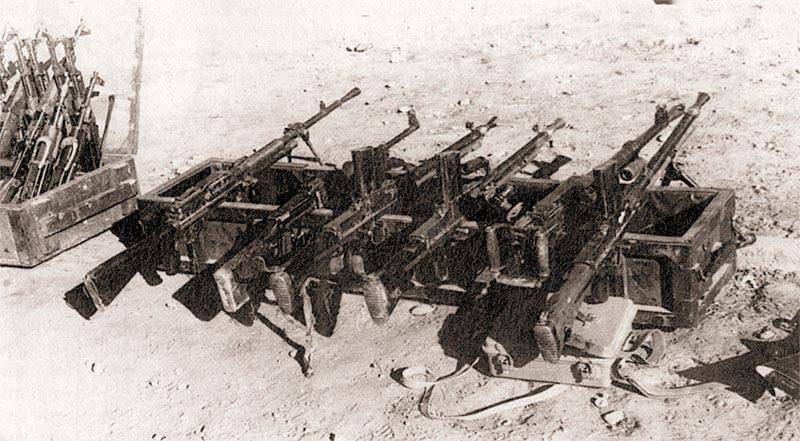The end of the "wandering" MLRS

At the beginning of the winter of 1985, I served in a special squad in the area of the city of Ghazni in southwestern Afghanistan. The plateau on which our squad was stationed was at a height of more than 2000 meters, and therefore it was very cold in the winter. And as we climbed into the mountains surrounding the plateau, our groups, sent out to carry out ambushes, especially suffered from the cold. By morning, one and a half liter flasks of water were frozen by almost a third, no matter how they tried to protect them from frost. I had to break the ice through the neck with a ramrod.
Because of the heavy snowfalls, mountain passes were impassable for “spirits” vehicles, and pack caravans in our area were rarely encountered. Our province was in the depths of the country, and drag weapon and the ammunition on such camels on the camels was apparently considered inappropriate by the rebel command. Therefore, the detachment was mainly engaged in reconnaissance for itself, and the main type of military operations was the clearing of the villages and enemy base areas in the mountains by the forces of the entire detachment.
However, it was impossible to completely stop the ambush, and the army headquarters would not allow it. And our commander, Major Popovich, decided to carry out one-day ambushes. Before nightfall, a group of 20 people (the load rate of two Mi-8s in our area) landed in an area in which the enemy’s nighttime movements were observed or assumed, usually at a distance of 5 – 10 km from the place of the intended ambush. at dawn, helicopters or an armored group evacuated to a point of permanent deployment. The following evening, another group, as a rule, of the same company again landed, but only in another place. Naturally, during such “short” ambushes there was no need to wait for special results.
Incomplete personnel in companies because of injuries, diseases and other causes reached 40 – 50% of the number, and therefore no more than two groups could work alternately from the company. One in the morning returned, the second is preparing for the evening landing.
On top of our misfortunes, all sources of information — agent reconnaissance groups, Khad and Tsarandoy bodies — could not provide us with accurate intelligence, and we had to rely solely on the results of our own observations of the enemy.
The enemy did not conduct intensive actions either (as we were joking - we had a winter truce with the rebels until the spring), but one roaming rocket volley fire still annoyed us. Like us, she led “single-pitch” actions. It will come out at night at the eReS flight range, fire a volley and hide at dawn somewhere in the kishlak zone or in the mountains. There was no information about its basing, she constantly changed firing positions, and so far our gunners of a separate motorized rifle regiment, located with us, would come to their senses, but they would return a salvo, the calculation of the rebels' launcher was already far away.

25 November I received the task of conducting an ambush in the mountains southeast of Ghazni. My reconnaissance group 212, consisting of 16, a man from the first company (including me and my deputy ensign Zyukhanov) with two radio telegraphists of the communication group and two miners, had to be landed by landing from two Mi-8 helicopters into the gorge that crossed the narrow mountain ridge separating our province from the province of Gardez, which was also in our area of responsibility, and to ambush in the eastern foothills of this ridge.
Initially, it was intended to choose a landing site in the eastern foothills north of the ambush area, so that the movement of the group was carried out on a more even terrain and was safer. However, in the end, it was decided to parachute into the gorge in the very center of the mountain range in order to hide the landing site from possible observation of the enemy.
The pilots from the prospect of a similar landing were, of course, not thrilled, but in the end I, using good relations with the commander of the lead crew, managed to persuade them to make the flight and sit exactly as we wanted, and were not prescribed by the instructions of the Air Force headquarters. The flight took place at an extremely low altitude - 2 – 3 meters above the ground, and at the entrance (or rather, the entrance) to the gorge the pilots did not rise above the mountains, but continued to keep the same height. I must confess that I was scared myself when I saw that we were sneaking along the bottom of the gorge, rocky slopes were rising to the left and right of us and the gorge was far from direct. And the speed of movement is about 140 km per hour. However, in 1985, such a squadron of helicopter pilots interacted with us, the pilots of which really could fly “on a log”, and our flight was successful, although once we did catch a stone with a wheel. With our speed and the fact that I was amazed during the whole flight, how the propeller of our helicopter fits between the slopes - the feeling was not pleasant.
We landed at dusk, and at nightfall we moved east. We walked along the beds of dry streams. The risk, of course, was, and not small. It was impossible to send out side guarding: not from whom. In addition, when moving on flat terrain, the lateral watch moves at the same speed as the main group, and try to move along the ridge!
Of course, we took some safety measures while moving - the head patrol was sent, suspicious areas were inspected, but the movement was organized to ensure that the ambush was quickly reached, and not to ensure maximum safety. The calculation was correct, and in about four hours we reached the exit to the Gardez plain.
The road leading from the kishlak zone south of Gardez to the depths of the mountain massif into which we landed was unwound. The 1: 10000 scale maps of the 1976 edition of the year we used were very inaccurate, and we had such inconsistencies all the time. The ambush area was chosen on the map without prior reconnaissance from the air, so I discussed in advance at the headquarters of the detachment my right to change the ambush area, within reasonable limits, according to the situation. Such a change was considered in the order of things, and if you gave the coordinates of your location, not very different from those specified in the combat order, there was nothing wrong with that. The commander of the group on the ground knows better where it is really better to arrange an ambush.

The road on which we went, "had a place to be." However, she managed to germinate and wither grass in a rut (for some reason, this area was not covered with snow, as in the western foothills). That is, this road did not use at least summer and autumn. It was unlikely that it would take advantage of it at night when we set out to ambush. Therefore, having placed the group in battle formation, I considered it necessary to send an additional reconnaissance patrol consisting of three people headed by sergeant Alyshanov, whom I trusted so that they would nevertheless determine whether there is a road on this section that is actually used for movement from east to west. I was sure that there was such a road.
And the subgroup of Alyshanova found such a road a few kilometers south. When Sergeant Alyshanov reported to me about his find, I decided to change the place of the ambush. To start, without touching the main forces of the group, I, under the protection of one intelligence officer, joined Alyshanov at the discovered road (it was not marked on the map) and, after checking his observations, contacted P-392 with Ensign Zyukhanov, who remained with the main forces.
Zyukhanov organized the mining of the old road just in case with mines with a daily deadline of self-destruction - after all we were in the area where civilians lived, and therefore we were strictly prohibited to put minefields without a deadline for self-destruction, and brought the group to a new place.
The new place seemed to ambush very promising. The road was heavily knurled, and, judging by the tracks, the movement was actively carried out both from the plain to the mountains and in the opposite direction. Traces were fresh.
Since we did not know where the rebels could go from, I decided to divide the group into two parts. A group of twelve people, led by ensign Zyukhanov, I sent closer to the mountains with the task of settling down at the first tactically comfortable height above the road, possibly having a sector of fire and an exit from the gorge.
The difficulty of finding such a height was that it was located at a sufficient distance from the nearest mountain peaks, taking which the rebels could have an advantage in case of finding the Zyukhanov subgroup.
He himself, with the rest of the people and the radio telegraph operator, settled down on a plain in a dry bed, stretching along the road at a distance of 15 – 20 meters from it.
In the event that the rebels appear from the gorge, the Zyukhanov subgroup passes the head vehicle, fires everything that falls into the real fire zone of AGS-17 and two PC machine guns; My subgroup is engaged in the head machine, opening fire at close range. If the cars move in the opposite direction, we miss Zyukhanov as many cars as he can pass by us before opening fire on the head car, - according to the situation, we deal with the enemy who was within reach of our fire.
In any case, the head or the only car (how many of them will be there) should have been let through in order to be damaged by the means of the subgroup, the farthest along the route.
In case of unfavorable development of the battle due to the numerical advantage of the enemy, escape routes were provided. I immediately contacted the combat control center of the detachment and conveyed my wishes to the on-call pair of Mi-24 helicopter gunships.
The twenty-fours flying time was 20 minutes, and the issues of interaction with them and targeting at night were worked out in advance. So I didn’t have much concern about unfavorable developments. The main thing was not to let yourself be surrounded by superior enemy forces directly at the subgroup locations, but this was too unlikely.

At three o'clock in the morning we heard the noise of a tractor engine heading from the kishlak zone to the mountains. An observer, expelled from my subgroup along the road, reported that there was a 6 man in the tractor, all armed. The enemy did not take any security measures. Observation posts did not detect helicopter landings, and no one was waiting for us in the area.
I gave the order not to reveal myself. Having informed Ensign Zyukhanov of information about the enemy so that he could organize subgroup fire in advance, focusing on just such a goal, I set the task for the group to observe the outskirts of the kishlak zone — suddenly some other vehicles would follow the tractor.
Zyukhanov advanced to the foot of the height several scouts armed with machine guns with a device for silent shooting. In the event that they did not succeed in quickly destroying the rebels with sudden fire from close range, then machine gunners located on the tactical crest would be involved.
We really didn’t want to immediately locate our location with machine-gun fire, firstly, because it was unsafe and nearby gangs could take measures to find and destroy us, and secondly, if the ambush could be carried out silently, we could count on the remaining three hours of dark time wait for an additional “result”.
The machine gunners managed to destroy the four rebels in the trailer with fire PBS, while the fifth managed to escape. In addition, the seriously wounded driver managed not to lose control and, turning around, tried to get out of the fire zone. One of the machine-gunners had to destroy it in several short bursts.
The fact that the PC gave several lines did not bother me very much - in the mountains at night they often fired and the enemy could not pay attention to it, but the fact that one of the guards managed to escape was dangerous. He ran towards the kishlak zone, and in the nearest kishlak, to which there were only 1000 – 1200 meters from my subgroup, would have raised the alarm. It threatened to trouble.
Lucky for us, the moon came out and the terrain was clearly visible through night vision binoculars. Having moved far enough away from the place of the tractor’s death, the escaped felt safe and stepped onto the road. The fact that between him and the nearest village is another subgroup, he did not suspect. Initially, I wanted to order the capture group to take him prisoner, but through binoculars it was clearly visible that he had a charged grenade launcher in his hands and he was moving quite carefully, ready to immediately respond to the danger. As such, the task of getting the prisoner to the group was not set, and I decided not to risk it. We destroyed it from a PB gun.
Make sure everything is quiet. There is no movement in the nearest villages and on the road. I allowed Zyukhanov to send an inspection team from a height to inspect the tractor. After some time, he received a report that a twelve-barreled salvo-fire installation was found in the trailer. At the time, it was a very valuable result, keeping the group divided in anticipation of something else was unwise. It was much more reasonable to combine all forces at the height occupied by the subgroup of Ensign Zyukhanov, and organize a circular defense there in case the rebels tried to recapture the captured installation.
We installed a mine-surprise on the road, the explosion of which could serve as a signal to us that someone was moving from the kishlak zone, and moved to a height.
It must be said that the time before dawn was quite restless, as some movement was clearly audible from the side of the gorge. But in the field of view of the observers the enemy did not fall. In all likelihood, machine-gun bursts did not go unnoticed by the rebels in the mountains, and they fussed around to clarify the situation. I categorically forbidden to open fire without extreme necessity, in order not to open in advance the positions of our firing points. Having established a connection with the Center, we reported on the situation and our conclusions on it. Fire support helicopters on duty were alerted to number 1.
Apparently, the enemy at the moment in this section did not have sufficient strength and determination to impose a night battle on us. On their part, this was a clear mistake, since with the onset of dawn the area was immediately taken under patrol by the army aviation. At our request, the pilots launched rockets at the heights surrounding our location, from where we could be bombarded and everything was quiet. To get involved in a fight, if there were 4 Mi-24s above your head, and even 2 Su-25s circling over the intestinal zone in non-equipped positions in advance, it was a clear suicide for the rebels, their command understood this.
The evacuation of the group from the ambush area went smoothly, except for the fact that the first attempt to lift the helicopter with our trophy aboard almost ended pitifully. The Mi-8 didn’t have enough lifting force, and it fell to the ground. Fortunately, the height was small and no one was hurt. The second attempt turned out to be more successful, and with the captured “result” we got to our town.
The installation was requested a week later by Moscow, where it was sent by plane.
Information